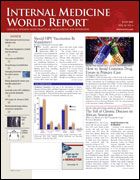Publication
Article
Internal Medicine World Report
Safety of Clot-Busting t-PA Therapy Questioned
Author(s):
J Exp Med
The clot-busting drug known as tissue-plasminogen activator (t-PA), commonly used by emergency medical teams in patients presenting with myocardial infarction (MI) may have a darker side, raising patients' risk for dangerous arrhythmias and triggering an unhealthy constriction of coronary vessels, according to results of a recent animal study (. 2006;203:2191-2200).
The study evaluated a line of genetically engineered mice whose cardiac nerve cells did not generate natural t-PA (a protease enzyme released by the body). These mice had a greatly subdued sympathic nervous system response when stimulated by an electrical field. The hearts of the t-PA–deficient mice also failed to produce the spike in norepinephrine when the normal mice were placed under electrical field stimulation. In addition, mice without functioning t-PA had much lower rates of arrhythmia when subjected to ischemia and reperfusion compared with normal mice.
These findings support the notion that the release of t-PA by cardiac nerve cells is a prime culprit in the cardiac arrhythmias associated with MI, the investigators noted.
"In some cases, using this drug might make matters worse. In our study, we found that t-PA boosts cardiac nerve cell production of a powerful neurotransmitter called norepinephrine," said lead investigator Roberto Levi, MD, of Weill Cornell Medical College, New York City.
The exact biochemical chain of events linking the enzyme to norepinephrine release is not yet known, but norepinephrine is known to raise the risk of arrhythmia by activating beta receptors on the surface of cardiac cells.
Dr Levy pointed out that these data are preliminary, and it is too early to offer any recommendations for clinical practice.
"Still, our finding does raise intriguing new questions about this therapy," he said. "It also opens a new window into the mechanisms behind arrhythmia, suggesting possible new therapeutic targets."





